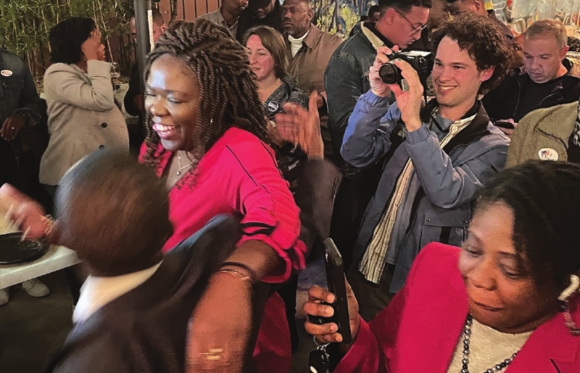
At-large Councilor Ruthzee Louijeune celebrates victory on election night.The Boston City Council election was as sleepy as expected for an off-year contest with no mayor on the ballot. Just 19% of registered voters turned out to cast ballots for an eight-way at-large race and six contested district races.
But behind those low turnout numbers on Nov. 7 was a quiet battle for the soul of the city, with a group of conservative business owners ponying up $320,000 to Forward Boston, an independent expenditure political action committee that backed five right-leaning candidates. That PAC squared off against a coalition of labor unions that backed four progressive-leaning candidates with $100,000 spent on glossy mailers sent to likely voters through its Bold Boston PAC.
Mayor Michelle Wu also backed the four progressive-leaning candidates, each of whom won election in contested races, expanding her reach into the body that is meant to check her power.
By the numbers, the changes to the Council were not as sweeping as $420,000 in outside spending would have suggested. Two of the most progressive members — Jamaica Plain-based District 6 Councilor Kendra Lara and Hyde Parkbased District 5 Councilor Ricardo Arroyo — who had already been ousted in the primary, were replaced by Wu-backed candidates, attorney Ben Weber in 6 and Enrique Pepén, who headed Wu’s Office of Neighborhood Services.
Just two of the five candidates backed by Forward Boston, funded by Trump supporter and New Balance Chairman Jim Davis, made the cut — incumbent atlarge Councilor Erin Murphy and Dorchester-based District 3 candidate John FitzGerald. The Council remains a left-leaning body in a city that has consistently backed progressive candidates in recent election cycles.
Vanessa Snow, an activist with the Right to the City Vote coalition, said the conservatives’ relatively poor showing demonstrates the limitations of outside funding: Forward Boston paid for mailers and robocalls, but could not deliver the boots on the ground that the labor unions and city workers produced for Wu’s endorsed candidates.
In contrast to Forward Boston’s effort, all four of the candidates Wu and the Bold Boston PAC backed won seats. In addition to Weber and Pepén, Wu had backed her former director of civic organizing, Henry Santana, in the at-large race and her former advisor Sharon Durkan in District 8, which stretches from Beacon Hill to Mission Hill.
In all, the general election was a net win for progressives, said Armani White, an activist with Right to the City Vote.
“The candidates who won in the general were the more progressive choices,” he said. “But we
want to see how willing the councilors will be to stand up for the
community’s needs. They have to represent their districts and not be a
rubber stamp for the mayor. Time will tell.”
White’s
concern over the council’s independence is shared among other
progressive activists, many of whom backed Wu in the 2021 election but
have become concerned about her moderate stands on issues, particularly
those surrounding police reform.
In
the last two years, the progressive wing of the Council worked in
concert with Wu to push forward shared policy goals, advancing a home
rule petitions on the mayor’s rent control proposal and real estate
transfer tax, for example. But they also clashed
with her on other issues, including a push for a return to an elected school committee — a measure Wu vetoed.
The
progressive wing of the Council also fought Wu on funding for the
Boston Regional Intelligence Center (BRIC), which administers the Boston
Police Department’s gang database, and pushed for a reduction to the
police budget.
In an
October vote on Wu’s request for funding for the BRIC, the council split
along racial lines, with all seven white members supporting the mayor.
On the campaign trail, Wu had pledged to dismantle the controversial
gang database. As mayor, she has told reporters that she thinks the
police department is now capable of maintaining a gang database without
race bias.
The
tension with the progressive wing of the Council may have prompted Wu
to back Arroyo’s and Lara’s rivals, said political activist Anthony
Collins, who has worked on the campaigns of Council and mayoral
candidates in Boston, including Wu.
“Wu
very obviously wanted a Council that wouldn’t push back on her from the
left as much as they clearly were,” he said. “That’s why she supported
moderates and her own staffers.”
Collins
and others say Wu has shifted significantly from the progressive ideals
she espoused during her 2021 campaign for mayor to more moderate
stands.
“Her whole
image is as a progressive mayor,” Collins said. “Now that she’s
backtracked from those values, that could do damage to her politically.”
In
the at-large contest, progressive incumbent Ruthzee Louijeune was the
top vote-getter, followed by Murphy. At-large Councilor Julia Mejia
finished in third place, followed by Santana. In District 3, FitzGerald,
a deputy director of real estate operations at the Boston Planning and
Development Agency, beat progressive Joel Richards, a former Boston
Public Schools teacher.
Turnout
was somewhat low in communities of color. In the Roxbury-based District
7, 5,675 ballots were cast. There, incumbent Tania Fernandes Anderson
handily beat challenger Althea Garrison with 70% of the vote. In the
District 6 race in Jamaica Plain and West Roxbury, which saw Weber
elected over William King, turnout was nearly three times as high, at
15,718.